Info
Benefits of Moringa for Breastfeeding and Postpartum
Moringa for breastfeeding is not a new concept in Asia. It has been used for decades to boost milk supply and replenish lost nutrients during delivery. Rich in iron, calcium, and essential vitamins, moringa provides significant benefits for new mothers during their postpartum period.
Breast milk is the best and most nutritious food for a newborn. A fed baby is a happy baby. It’s loaded with protective antibodies and nutrients that are essential for defending against infections, preventing allergies, and supporting a robust immune system. This ultimately contributes to the overall health of the baby.
However, not all newborns have easy access to breast milk. Some mothers may choose not to breastfeed, while others may struggle to produce enough milk due to various reasons. The rising number of mothers finding it difficult to produce milk could be attributed to lifestyle changes and dietary habits, leading to stress. In such cases, formula milk may be sought as an alternative. However, there are ways to naturally enhance breast milk supply, such as nursing on demand or frequent pumping.
Yet, nursing and pumping alone may not always suffice. This is where galactagogues come into play.
Galactagogues are substances known to increase breast milk production. With numerous galactagogues available, it can be overwhelming to choose the right one. Lactation professionals often recommend natural, time-tested options, and moringa stands out as one of the best galactagogues for nursing mothers.
Moringa: The Superfood for All
Moringa (Moringa oleifera), commonly referred to as the Miracle Tree, is native to Asia and Africa. Every part of this tree is beneficial for various applications. Moringa has gained recognition for its medicinal properties and health benefits. It not only supports lactation but serves as a superfood packed with essential nutrients vital for overall health.
In Asian and African cultures, moringa leaves have been utilized as food, a vitamin source, and a healing herb. Its high nutritional content has contributed to its status as one of the most sought-after exported foods.
Moringa can be consumed in several forms, including as food, powder, supplements, and drinks like moringa tea.
Also Read: Health Benefits of Moringa Tea
This nutrient-dense food is rich in essential minerals and vitamins, including iron, calcium, and vitamins A, E, and K. Moringa leaves also contain a high amount of plant protein, complete with all essential amino acids, fiber, and antioxidants.
The nutritional profile of moringa leaves, when compared gram for gram, is impressive:
- 25 times the iron found in spinach
- 15 times the potassium of bananas
- 17 times the calcium of milk
- 10 times the vitamin C of carrots
- 9 times the protein of yogurt
- 7 times the vitamin C of oranges
Among these nutrients, protein, calcium, iron, and vitamin K are especially beneficial for new mothers during breastfeeding.
Iron in Moringa Reduces Fatigue and Tiredness – Most new moms experience fatigue and tiredness. During birth, women lose blood, resulting in decreased iron levels, leading to weakness and exhaustion. A single serving of moringa leaf powder provides 46.8% of the recommended daily intake of iron, making it an excellent addition to green smoothies along with other leafy greens.
Calcium in Moringa Strengthens Bones and Teeth – This mineral is crucial for both mother and baby. Infants rely on their mother’s calcium reserves during pregnancy and breastfeeding, necessitating additional calcium intake to ensure both mother and child have sufficient supply for strong bones.
Vitamin K in Moringa Aids Normal Blood Clotting – Vitamin K is essential for both new mothers and infants. Newborns typically receive vitamin K through injections or oral tablets at birth, and it’s similarly important for mothers after delivery, especially if experiencing heavy bleeding.
Moringa for Breastfeeding: The Study Reports and Research Claims
Scientific studies support the efficacy of moringa in increasing breast milk supply. The leaves of this plant are natural galactagogues that have been used traditionally to promote lactation and provide early nourishment for both babies and new mothers.
(1) The first study, published in The Philippine Journal of Pediatrics in 2013, reviewed five scientific studies that tested moringa’s effect on milk supply. The results indicated that moringa significantly increased breast milk volume compared to a placebo.
(2) The second study, also in The Philippine Journal of Pediatrics, involved mothers of preterm infants who were given either moringa or a placebo three days post-delivery. The participants pumped milk on a consistent schedule. The findings revealed that mothers who consumed moringa produced more milk by postpartum days four and five compared to those who received the placebo.
(3) Another study from the American Academy of Pediatrics’ Section on Breastfeeding in 2002 examined the LactMed section on moringa and found that its consumption positively affected milk production in new mothers, particularly those with premature babies. Mothers who consumed moringa or medications like domperidone or metoclopramide produced more milk than those on a placebo.
No documented side effects from consuming moringa while breastfeeding have been reported, and most experiences have been positive, including enhanced milk production, increased energy levels, and improved immunity.
Regardless, it’s always wise to consult with a lactation consultant or healthcare provider for tailored advice.
If you are pregnant, trying to conceive, or on medication, consult your physician before incorporating moringa products into your routine.
How Moringa is Taken for Lactation
Moringa has been a staple in medicine and food, particularly during postpartum recovery. In many Asian countries, moringa leaves are commonly added to a variety of dishes, soups, and beverages. It is often included in chicken soup for new mothers to aid in breastfeeding.
Over the years, the benefits of moringa for breastfeeding and general health have gained recognition in the Western world, leading to various means of consumption tailored to maximize its advantages, especially for mothers.
If fresh moringa leaves are available, incorporate them into soups, smoothies, cooked vegetables, or prepare infused hot drinks. If fresh consumption isn’t feasible, purchase organic moringa powder to add to similar dishes and enjoy. Moringa supplements are also widely available.
What Does Moringa Taste Like?
Moringa has a rich iron content, giving it a strong, earthy flavor similar to matcha and spinach. It pairs well with green smoothies, juices, apple juice, coconut water, and savory dishes.
Shop The Moolihai Moringa Range
Moolihai Moringa Leaves – 100% natural and organic fresh moringa leaves can be used in curries or added to vegetable stir-fries. Create a fresh and spicy soup using moringa leaves, pepper, salt, and your choice of vegetables.
Moolihai Moringa Powder – Our moringa leaves are sourced from naturally grown trees, dried, and powdered without any overprocessing, added ingredients, colors, or preservatives. Simply add 1 or 2 tablespoons of powder to your smoothie for a nutritious boost.
Moolihai Moringa Capsules – Convenient and healthy supplements made from pure organic moringa powder, these capsules also include a selection of other Ayurvedic herbs for enhanced benefits. Typically, two capsules daily are recommended, but it’s best to consult your healthcare provider for personalized advice.
Moolihai Moringa Tea – A fantastic brew made from naturally dried moringa, offering an earthy flavor similar to green tea. Enhance your tea with mint leaves, honey, lemon, or cinnamon for added flavor. Note that moringa tea may require a little longer to brew than traditional green tea. Enjoy a cup of hot moringa tea after meals for its health benefits.
Is Moringa Right for Me?
Ultimately, the decision about adding moringa to your diet should be made in consultation with your doctor, who can advise you on whether moringa is suitable for you and which type would benefit your breastfeeding journey.
As there are no recorded side effects from using moringa during breastfeeding, it is generally considered safe. Moolihai Organics is here to help you choose the best supplements for your needs.


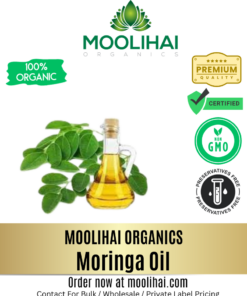
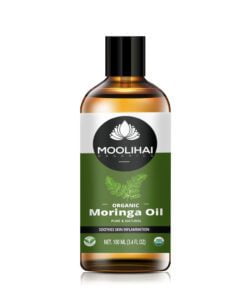
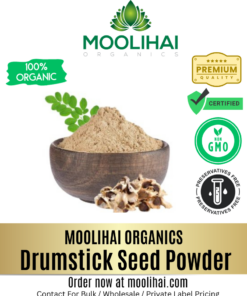

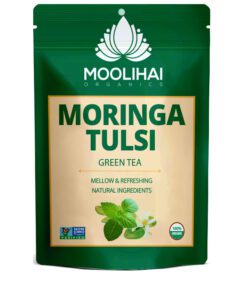
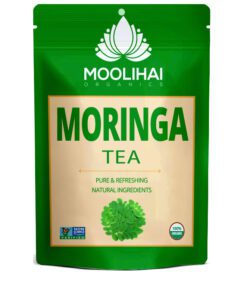
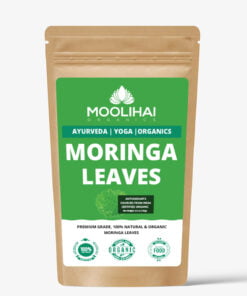

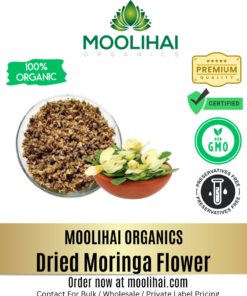

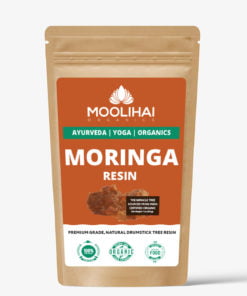



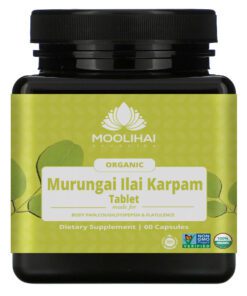
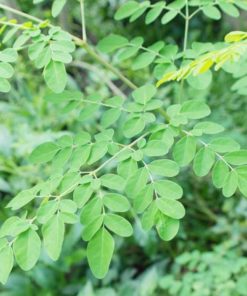
Ponnatharam Stone (Raw) | For Permanent Hair Removal
Vengai Paal | Black Bindi | Dhrishti Pottu | Vengai Pottu for Babies | 100% Natural
Dried Avaram Senna Flower / Cassia Senna Auriculata / Aavaram Poo / Tarwar / Amaltas Leaves / Senna Auriculata / Avaram Poo / Sanay / Alexandrina / Tanner’s Cassia flower
Natural Dried Moringa Flower – Moringa Oleifera – Drumstick Tree Flower – Murungai Poo – Munagaku Flower
Akasa Garudan Kilangu / Redfruit Creeper / Corallocarpus Epigaeus
Original Edible Camphor | Pacha Karpooram | Bhimseni Camphor
Saussurea Obvallata Seeds / Brahmakamal Seeds / Queen of the night / Sacred Saussurea Kon Kapfu / Brahma Kamalam / Nishagandha
Insulin Leaf Powder / Chamaecostus Cuspidatus / Costus Pictus / Spiral Ginger / Insulin Powder / Costus Igneus
Achu Pottu for Babies | Bindi Mould Set | Baby Seratta – 1 Set
Kaunch Beej Powder |Poonaikali | Velvet Bean Powder | Mucuna Pruriens | Kapikacchu | Natural Nervine Tonic & Muscle Builder
Aalam Pazham / Banyan Fruit Powder / Ficus Benghalensis / Marri Palu / Bargad / Dodda Alada Mara / Peraal / Vat Vriksha Powder
Traditional Vasambu Valayal for Babies | Calamus Bracelet | 100 % Pure & Natural